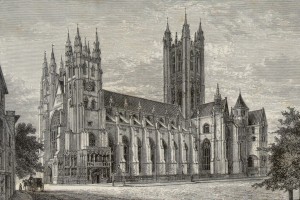| Archbishop
of Canterbury, author of Proslogion and Why God Human? and
forerunner of medieval scholasticism. |
 |
|
Canterbury
Cathedral
|
An Italian who became
a monk in Normandy, Anselm became Archbishop of Canterbury in 1098. In
this position Anselm clashed with English monarchs over the proper authority
of church and state. As a forerunner of scholasticism,
Anselm's primary importance for the history of theology is his emphasis
on the use of reason to understand revealed truth. Anselm did not aspire
to prove articles of belief through the use of the understanding but rather
to use reason to understand what he had already accepted by faith. Faith
seeking understanding was a leading concept in Anselm's theology. In his
Proslogion Anselm advanced the argument that God must indeed exist
because God is a being greater than which cannot be thought. Such a being
must then, he argued, have the property of existence. In his treatise
Why God Human? Anselm maintained that crimes are evaluated according
to the nature of the offense and with reference to those against whom
they have been committed. In the case of human sin against God, Anselm
maintained that it would require a human being to compensate for sins
committed by humans, but that such a human being must also be divine in
stature in order to atone for the offense of having committed such sins
against God. Christ was therefore in his view necessarily human and divine.
In both of these cases Anselm in typical Augustinian
fashion employs reason to elucidate truths already believed.
|